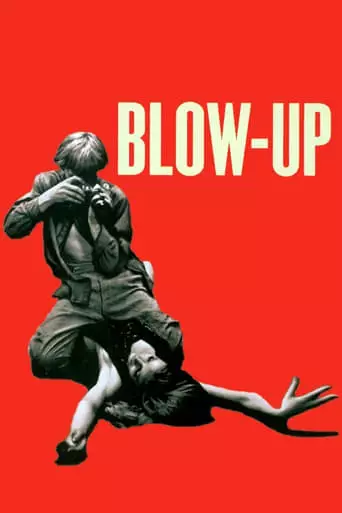
Blowup (1966) Watch Online Free
A successful mod photographer in London whose world is bounded by fashion, pop music, marijuana, and easy sex, feels his life is boring and despairing. But in the course of a single day he unknowingly captures a death on film.
Blow-Up is a 1966 psychological thriller directed by Michelangelo Antonioni, set in the vibrant and tumultuous London of the 1960s. The film follows Thomas, a successful yet disillusioned fashion photographer, who stumbles upon a potential murder while developing a set of photographs taken in a park. As he enlarges the images, he begins to question the reality of what he has captured, leading him down a path of obsession and existential uncertainty.
The film opens with Thomas taking photographs of a couple in a park. The woman, played by Vanessa Redgrave, notices him and demands that he return the film. After a brief confrontation, she leaves, but Thomas becomes intrigued by what he might have witnessed. He develops the photographs and enlarges the images, discovering what seems to be a murder. However, the more he examines the photographs, the more the images become ambiguous, blurring the line between reality and illusion. The film ends with an unresolved mystery, leaving the audience to question whether a crime was committed or if Thomas’s obsession has distorted his perception of reality.
Blow-Up explores several key themes, including the nature of reality, the power of the camera, and the objectification of women. One of the film’s central themes is the unreliability of perception. Through Thomas’s obsession with the photographs, Antonioni critiques the way images, particularly photographs, can distort the truth. The film also delves into the role of the artist and the alienation that comes with fame. Thomas, although at the peak of his career, is detached from the world around him and is increasingly consumed by the mystery in his photographs.
The movie is also a commentary on the swinging London scene of the 1960s, portraying a world of superficiality, consumerism, and sexual liberation. Thomas’s interactions with women are marked by objectification and detachment, reflecting the era’s gender dynamics and the commodification of beauty. The film critiques the disconnection between individuals, even in a society that champions freedom and individuality.
The film’s open-ended conclusion has made it a subject of much debate. Some critics view it as a metaphor for the failure of modern art to convey truth, while others interpret it as a statement on the absurdity of seeking meaning in a chaotic, meaningless world. Regardless of interpretation, Blow-Up remains a striking exploration of the limitations of perception and the fragility of truth.
After watching Blow-Up, you may feel a sense of unease and ambiguity. The film’s unresolved mystery leaves you questioning the nature of reality and the limits of human perception. You might feel a certain detachment from the characters, especially the protagonist, Thomas, whose aloofness and objectification of others create a barrier between him and the audience. The film’s philosophical themes may lead you to reflect on your own relationship with images, technology, and the search for meaning in a world that often seems devoid of it.
The haunting final scenes, which include the mysterious disappearance of key characters and the surreal tennis match with imaginary balls, may leave you with a sense of disorientation. Ultimately, Blow-Up is a film that doesn’t provide easy answers but instead invites you to sit with its ambiguity, challenging your assumptions about art, truth, and the nature of reality
